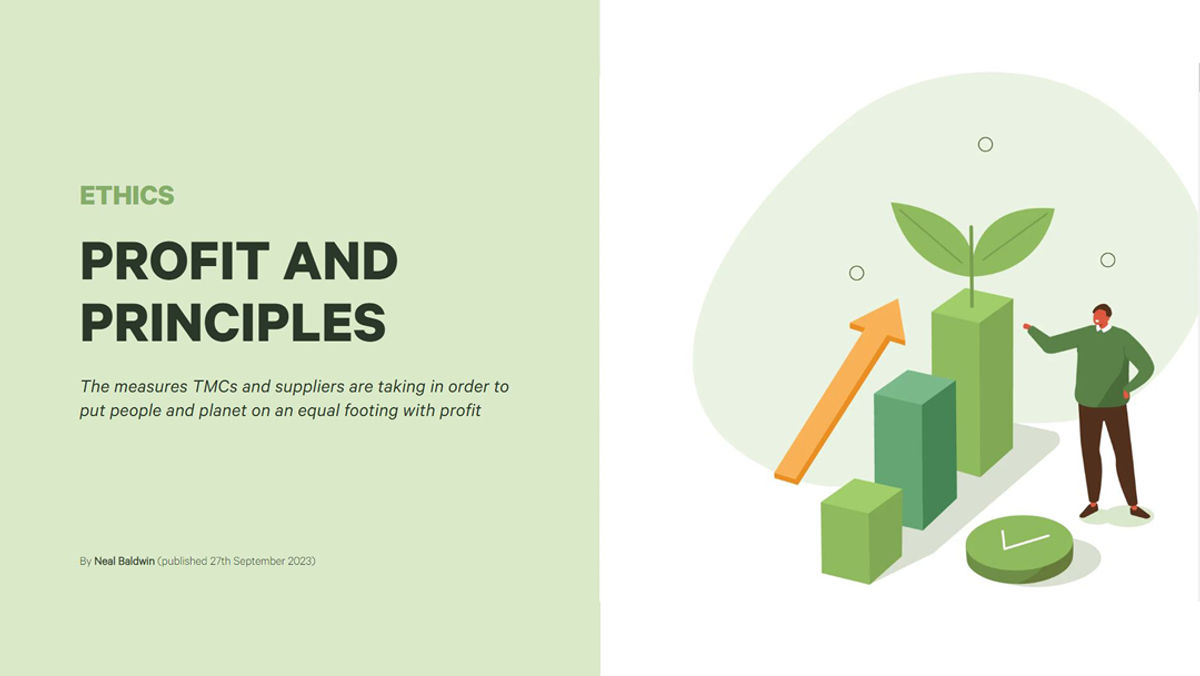When Greta Thunberg cancelled her planned appearance at the Edinburgh International Book Festival in August it was a story for our age. The young environmental activist pulled out after learning the event’s main sponsor, fund manager Baillie Gifford, invests in companies connected with fossil fuels.
While her decision not to speak, in protest of so-called ‘greenwashing’, was completely on-brand for Thunberg, the consequence was that hundreds of fans would miss out on hearing her speak. Having principles – and sticking to them – is rarely easy.
In the world of corporate travel, taking action and making compromises to meet green targets is a well-documented issue. The sector is built on the high consumption of resources and barely a week goes by without one company or another trumpeting its latest eco-initiatives, be it offsetting projects, investment in SAF, the hosting of low-carbon events or the latest app-based tech – all in the name of environmental sustainability.
But what about the ‘S’ (Social) and ‘G’ (Governance) elements of ESG? Just how far are companies prepared to stick out their necks in the name of doing the right thing morally when the industry celebrates profit and the winning and retaining of clients above all else?
Martin Warner, principal at MW Travel Consultancy and former executive vice president, market strategy and segmentation at CWT, says: “You could argue that TMCs have taken strides when it comes to the issue of gender balance, diversity and equality in their own organisations, but when it comes to human rights down the supply chain, I don’t think people are really looking. And you can forget about the majority of TMCs taking the moral high ground about a potential client that does business in a controversial area like animal testing or fossil fuels – how many are going to turn down a big contract?”
“If ever we have any moral or ethical concerns about any supplier, there is a very quick process to get them removed from our travel programme”
There seems to be something in Walker’s observation. According to a survey by Business Travel Show Europe, just 31 per cent of travel managers said they actively consider the human rights impact of their travel programmes to make positive choices. Meanwhile, only 5 per cent claimed acting in an ethical and socially responsible way was their top priority.
Of course, travel buyers are often in a bind – they have little influence on who their employer does business with or where in the world those transactions take place. If, for example, your company is selling widgets to Saudi Arabia, organising travel there is just part of the job no matter what your concerns about women’s rights, capital punishment or LGBT freedoms.
Siemens UK travel commodity manager Emma Eaton is among a small but growing band looking to make a difference by using her purchasing power to drive change. But she admits progress is relatively slow. “For example, we added Hilton to our programme after I saw the amazing work it was doing to educate front-of-house staff on the issue of people trafficking,” she says.
While Eaton can influence which UK suppliers Siemens uses, it is up to her country-manager counterparts around the world to act in a similar fashion – essentially creating a like-minded network that sources as ethically as possible for the benefit of the whole business.
“We use HRS for our global hotel programme, using its Green Stay initiative as a starting point since those included are likely the most ethically minded in all areas, and have a huge RFP programme. Our contracting is based on a huge number of things, with business factors such as location, quality, traveller safety and rate caps all in the mix.
“Obviously, Siemens has its stated ESG policy and this is in the equation, and as time goes on we are able to look at the social values of individual properties. It is happening country by country and is still a work in progress, but ultimately we are buyers, not detectives.”
Eaton continues: “All of our suppliers sign up to a rigid code of conduct, but essentially, when we send travellers away we are relying on HRS and the expertise of my peers in other countries to have made sound decisions. If ever we have any moral or ethical concerns about any supplier, there is a very quick process to get them removed from the programme.”

